|
|
|
Sort Order |
|
|
|
Items / Page
|
|
|
|
|
|
|
| Srl | Item |
| 1 |
ID:
163369
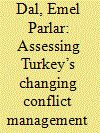

|
|
|
|
|
| Summary/Abstract |
This paper aims to shed light on Turkey’s conflict management role after the Cold War using a three-layered framework consisting of the layers of actorness, approaches and tools. In doing so, it seeks to profile Turkey’s international conflict management since the Cold War years with a special focus on the nature of its participation in conflict management as an active or passive actor, the perspectives from which it approaches conflict management, and the conflict management instruments it utilises. First, the paper will provide a conceptual framework of international conflict management based on the above-mentioned triad of actorness, approaches and tools as derived from the existing literature. Second, it will apply the selected three-layered analytical framework to Turkey to decipher its strengths and limitations in managing international conflicts.
|
|
|
|
|
|
|
|
|
|
|
|
|
|
|
|
| 2 |
ID:
160121
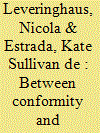

|
|
|
|
|
| Summary/Abstract |
China and India, as rising powers, have been proactive in seeking status as nuclear responsibles. Since the 1990s they have sought to demonstrate conformity with intersubjectively accepted understandings of nuclear responsibility within the global nuclear order, and have also sought recognition on the basis of particularistic practices of nuclear restraint. This article addresses two puzzles. First, nuclear restraint is at the centre of the pursuit of global nuclear order, so why have China and India not received recognition from influential members of the nuclear order for the full spectrum of their restraint-based behaviours? Second, why do China and India nonetheless persist with these behaviours? We argue that the conferral of status as a nuclear responsible is a politicised process shaped by the interests, values, and perceptions of powerful stakeholder states in the global nuclear order. China’s and India’s innovations are not incorporated into the currently accepted set of responsible nuclear behaviours because, indirectly, they pose a strategic, political, and social challenge to these states. However, China’s and India’s innovations are significant as an insight into their identity-projection and preferred social roles as distinctive rising powers, and as a means of introducing new, if nascent, ideas into non-proliferation practice and governance.
|
|
|
|
|
|
|
|
|
|
|
|
|
|
|
|
| 3 |
ID:
144252
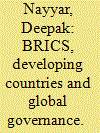

|
|
|
|
|
| Summary/Abstract |
This article analyses the implications and consequences of the rise of BRICS for the developing world and for global governance. In doing so, it examines BRICS’ increasing importance among developing countries and their growing significance in the world economy, situated in historical perspective, and considers the factors underlying the evolution of the group as an economic and political formation. This is followed by an analysis of the possible economic impact of future growth in BRICS on other developing countries, which could be complementary or competitive, positive or negative. In conclusion it discusses the potential influence of BRICS, extending beyond economics to politics, in the wider global context, with reference to international institutions and cooperation among developing countries.
|
|
|
|
|
|
|
|
|
|
|
|
|
|
|
|
| 4 |
ID:
140824
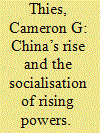

|
|
|
|
|
| Summary/Abstract |
The rise of China, and other states whose material power and ideational aspirations have outpaced that of their peers, presents an interesting challenge to international relations theorists. Structural theories rooted in realism tend to predict that changes in material power inexorably lead to conflict that reshuffles the pecking order at the pinnacle of the international system. Such theories also tend to ignore identity and other ideational factors that may condition the interaction of rising and dominant great powers. This article develops a theoretical approach to state socialisation of rising powers. While considering the importance of increasing material capabilities, this approach also examines the types of roles that states occupy in the international social system and the ability of great powers to socialise rising powers into what they consider to be appropriate roles. The 1995–1996 Taiwan Straits Crisis is analysed through this theoretical framework to demonstrate that although both China and the United States attempted to altercast each other in a socialisation process, neither was successful. China pursued its own, self-conceived role conceptions in the situation, as did the United States, setting the stage for renewed rivalry between the two powerful states. The case demonstrates the difficulty of constraining rising powers’ aspirations when their material power allows them to pursue the identities of their choice, even in the face of strong socialisation efforts from the dominant power and its supporters.
|
|
|
|
|
|
|
|
|
|
|
|
|
|
|
|
| 5 |
ID:
123536
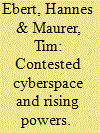

|
|
|
|
|
| Publication |
2013.
|
| Summary/Abstract |
The USA developed and has therefore historically played a lead role in cyberspace. Yet rising powers, including brics , have been increasingly challenging the established regime. China and Russia submitted a joint proposal on information security to the United Nations in 2011. India, Brazil, and South Africa have been focusing on the information society since their 2003 Brasilia Declaration. These initiatives demonstrate that cyberspace has become hotly contested. However, there is still a need to explain this divergence. Are rising powers challenging the USA because of their national interests, the urge to maximise their security, or do factors such as values and political structures explain the different trajectories vis-à-vis the hegemon? This article examines the foreign policies of brics from 1995 to date, explaining the influence of different path-dependent origins, of the systemic shift and the type of political system, together with rising civil society pressure.
|
|
|
|
|
|
|
|
|
|
|
|
|
|
|
|
| 6 |
ID:
168952
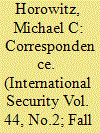

|
|
|
| 7 |
ID:
124888
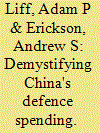

|
|
|
|
|
| Publication |
2013.
|
| Summary/Abstract |
China's limited transparency concerning its defence spending harms strategic trust, but foreign analysts often lose sight of important realities. Specific details remain unclear, but China's defence spending overall is no mystery - it supports PLA modernization and personnel development as well as its announced objectives of securing China's homeland and asserting control over contested territorial and maritime claims, with a focus on the Near Seas (the Yellow, East, and South China seas). This article offers greater context and perspective for Chinese and Western discussions of China's rise and concomitant military build-up through a nuanced and comprehensive assessment of its defence spending and military transparency.
|
|
|
|
|
|
|
|
|
|
|
|
|
|
|
|
| 8 |
ID:
195397


|
|
|
|
|
| Summary/Abstract |
This article examines ‘diasporic geopolitics’ as a significant factor in the future of global politics. Whereas discussions of global order in IR have been highly spatialised, we instead highlight the extent to which different regions of the world are entangled via ongoing migration processes, and their legacies in the form of global diasporas. We examine the significance of these interconnections by focusing on rising powers and their relations with the existing international order. Major migration-sending states such as China, India, and Turkey are now aspiring great powers that seek to exert global influence in international affairs. In this context, their diaspora governance policies are also undergoing a transformation, with diasporas increasingly understood as important assets for promoting sending states’ geopolitical agendas and great power ambitions. We examine three mechanisms by which such states exert power transnationally via their diaspora engagement policies. States can treat ‘their’ diasporas as economic assets that facilitate trade and foreign investment; as soft power assets that contribute to the promotion of ‘civilisational’ politics; and as diplomatic assets that can be strategically mobilised or repressed. We conclude by discussing the implications for thinking about the nature of global order and power politics in the coming 50 years.
|
|
|
|
|
|
|
|
|
|
|
|
|
|
|
|
| 9 |
ID:
124864


|
|
|
|
|
| Publication |
2013.
|
| Summary/Abstract |
An objective assessment reveals that India, simply because it is a democracy, will be no less likely than China as a rising power to pose significant challenges to U.S. interests. While Washington has basically gotten its China policy right, a new approach to India is needed.
|
|
|
|
|
|
|
|
|
|
|
|
|
|
|
|
| 10 |
ID:
128742
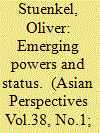

|
|
|
|
|
| Publication |
2014.
|
| Summary/Abstract |
Why did the leaders of four very different countries-Brazil, Russia, India, and China-decide to hold a summit in 2009 in Yekaterinburg, thus transforming "the BRICs" from a financial category into a political grouping? I argue that the main driver for the first summit to take place and succeed was to strengthen each member country's international status. The 2009 BRICs summit was successful in that it led to the birth of a political platform during highly unusual international economic and political circumstances. In a global economy in the midst of a recession and widespread uncertainty, the BRICs' relative economic stability and capacity to respond to the crisis was decisive and lent credibility to their call for reform of the international system. The United States' temporarily reduced legitimacy also provided a window of opportunity for emerging powers to act as aspiring guarantors of stability in tomorrow's world. While measureable gains from cooperation and stronger rhetoric that delegitimized the global order did occur in the following years, they were not the primary drivers for the first summit to take place and succeed.
|
|
|
|
|
|
|
|
|
|
|
|
|
|
|
|
| 11 |
ID:
144258
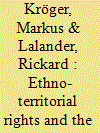

|
|
|
|
|
| Summary/Abstract |
In recent times a growing number of Latin American rural groups have achieved extended ethno-territorial rights, and large territories have been protected by progressive constitutions. These were the outcomes of extended cycles of national and transnational contentious politics and of social movement struggle, including collective South–South cooperation. However, the continent has simultaneously experienced a resource extraction boom. Frequently the extractivism takes place in protected areas and/or Indigenous territories. Consequently economic interests collide with the protection and recognition of constitutional rights. Through a review of selected demonstrative cases across Latin America, this article analyses the (de jure) rights on paper versus the (de facto) rights in practice.
|
|
|
|
|
|
|
|
|
|
|
|
|
|
|
|
| 12 |
ID:
178854
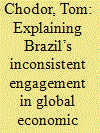

|
|
|
|
|
| Summary/Abstract |
The growing significance of rising powers has led to debates about their role in global economic governance, with expectations they will either challenge its neoliberal agenda or become ‘responsible stakeholders’. However, the reality is that the role of rising powers is inconsistent: in some areas they accept the neoliberal consensus, while in others they contest it. This article utilises the State Transformation Approach to explain the inconsistent positions of Brazil: its support for free trade at the WTO, and its contestation of capital account liberalisation at the IMF, followed by a reversal and acceptance of it after 2014. The article argues this inconsistency can only be understood by analysing the domestic context of foreign policymaking, particularly the fragmentation of its state and the balance of forces in its political economy. In relation to trade, the fragmentation of the state enabled the agro-export sector to dominate formulation of policy. In finance, on the other hand, the greater autonomy of policymakers, and a balance of forces favouring intervention enabled the promotion of capital controls. However, this was a contingent outcome of socio-political struggles, and once the balance of forces shifted from 2014, financial forces reasserted themselves provoking a return to the orthodoxy.
|
|
|
|
|
|
|
|
|
|
|
|
|
|
|
|
| 13 |
ID:
158386
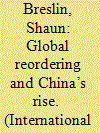

|
|
|
|
|
| Summary/Abstract |
While much of the debate over the implications of China’s rise tends to dichotomise around either status quo or revisionist predictions, the reality seems to lie somewhere in between. In broad terms, China has embraced multilateral forms of cooperation and governance. This does not mean, however, that it is satisfied with the distribution of power in many international institutions, or some of the norms and principles that underpin them. This has resulted in a reformist position, with China increasingly willing to offer its own supplementary alternatives. China’s rise has also provided an important economic alternative to dealing with the West, and considerably undermined the ability of others to establish their preferences and world views. China’s lack of commitment to democracy and the external promotion of human rights remains a key reason why some analysts remain unconvinced about the long-term ambitions of an illiberal actor in a global liberal order.
|
|
|
|
|
|
|
|
|
|
|
|
|
|
|
|
| 14 |
ID:
123369
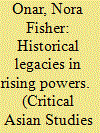

|
|
|
|
|
| Publication |
2013.
|
| Summary/Abstract |
This articles emanates from the observation that realms like theory and broad comparison have typically focused on Western concerns and geography while actors such as China and Turkey have been relegated to the undervalued field of areas studies. Noting that this inhibits our ability to uncover important cross-regional comparisons, the author suggests that "former empires/rising powers" (FERPs) across (Eur)Asia are a promising unit of analysis. To make the case for the FERPs, the author embeds four cases - Turkey, Iran, Russia, and China - in a common problematique, showing that their encounter with Western hegemony/modernity engendered three waves of confrontation vis-à-vis the legacies of empire. These confrontations entailed Eurocentric denial as well as Occidentalist reification of native pasts, both of which are being superseded by what the author calls "authenticist" histories empowered by the crystallization of multiple modernities. The author then develops a theoretical framework to capture how reinvented pasts serve as sources of identity, normativity, and action. This approach enables an in-depth account of the Turkish case to show that both official and market actors claim continuity with an Ottoman-Islamic heritage from which a homegrown humanism is said to emanate. These narratives - and the tools through which they are promoted from the cultural industries to public diplomacy - may be helping Turkey and other erstwhile (Eur)Asian empires recalibrate national identity and international purpose at a time of global transformation.
|
|
|
|
|
|
|
|
|
|
|
|
|
|
|
|
| 15 |
ID:
148255
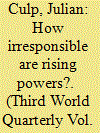

|
|
|
|
|
| Summary/Abstract |
Rising powers like Brazil, China and India have recently made significant gains in their capabilities as states. Therefore many IR scholars are claiming that these powers must now contribute more to the provision of global public goods like a clean environment, free trade and human rights. This article will argue that reasonably democratic international political discourses are another global public good whose greater supply is sorely needed and that rising powers are having a positive impact on the creation of such discourses. Thus rising powers are not behaving as irresponsibly as many IR scholars assume.
|
|
|
|
|
|
|
|
|
|
|
|
|
|
|
|
| 16 |
ID:
185098
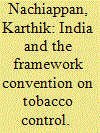

|
|
|
|
|
| Summary/Abstract |
This paper investigates why India actively negotiated and ratified the Framework Convention on Tobacco Control (FCTC), the first global health treaty to curb tobacco use worldwide. The World Health Organization’s (WHO) decision to conduct FCTC negotiations aligned with India’s shifting disease burden that was pivoting from infectious to non-communicable diseases, particularly cancer, which shot up due to surging tobacco use. The WHO’s decision to frame the agreement around constraining global tobacco commerce, particularly the might of multinational tobacco companies, meshed with the interests of New Delhi, which was concurrently seeking to curb surging tobacco consumption. This triggered a positive approach and attitude to FCTC negotiations, leading to India’s ratification. India’s negotiation and ratification of the FCTC shows that the literature(s) on rising powers and international organizations must consider how factors like the WHO’s institutional politics, specifically the intent to negotiate a focused global agreement to curb tobacco production and distribution worldwide, affects how countries perceive and seek to use that agreement to bolster domestic policy concerns like tobacco control.
|
|
|
|
|
|
|
|
|
|
|
|
|
|
|
|
| 17 |
ID:
162429
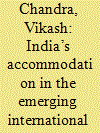

|
|
|
|
|
| Summary/Abstract |
This article has two-fold goals: to develop a coherent concept of accommodation and explicate variable shaping the process of accommodation; and to analyse and evaluate the challenges and prospects of India’s accommodation in the emerging international order. It defines accommodation as a ‘state strategy’ and ‘process’. It figures out six determinants viz. the sphere of influence, structural variables, convergence/divergence of national interest, perception and intention towards the international order, political and socio-cultural values, and costs of non- accommodation. Instead of addressing the process of accommodation from accommodation-seekers’ perspective, the article investigates the issue from accommodators’ perspective. Therefore, rather than describing traditional foundations of India’s claim of accommodation, i.e. population, territory, military, and democracy, it illustrates conditions under which the established power accommodate rising powers. By comparing and contrasting India’s interests, principles, and values vis-à-vis the USA and China, it demonstrates how differing strategic calculations, economic and commercial interests and divergence in political socio-cultural norms and values, China is posing or may pose challenges to India’s accommodation. It suggests that India needs to strike a balance between the declining America and rising China. It will have to learn how not to turn China from an adversary to an enemy. A prudent strategy for India will be to balance China, however, in the non-military, i.e. diplomatic, political and economic realms. Nevertheless, the engagement dimension should not be marginalised, actual or even perceived.
|
|
|
|
|
|
|
|
|
|
|
|
|
|
|
|
| 18 |
ID:
173798
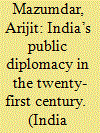

|
|
|
|
|
| Summary/Abstract |
In recent years, several countries have made sustained efforts to project their ‘soft power’ abroad. Public diplomacy has been an important tool for this purpose. Public diplomacy involves activities usually undertaken by a national government to inform and influence foreign public opinion and attitudes in order to advance its foreign policy goals. Such activities include ‘nation-branding’, diaspora outreach, digital engagement, international broadcasting, and international exchange programmes, all of which are designed to promote a positive image and reputation of the country to a global audience. This paper discusses the role of public diplomacy in the service of India’s foreign policy goals during the twenty-first century. The practice of public diplomacy helps the country achieve two significant objectives. First, it helps allay any active or dormant fears within the international community about India as a rising power. Second, it helps India compete with other countries as it seeks to boost foreign tourist arrivals, attract foreign investment and secure new markets for its exports in an era of globalisation. This paper also briefly discusses some of the challenges associated with India’s use of public diplomacy.
|
|
|
|
|
|
|
|
|
|
|
|
|
|
|
|
| 19 |
ID:
129051
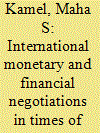

|
|
|
|
|
| Publication |
2014.
|
| Summary/Abstract |
The G20 leaders met for their third summit in Pittsburgh in September 2009. They agreed to institutionalize the G20 as the premier forum for their global economic cooperation, shift 5% of IMF quota shares and 3% of the World Bank's shares from the overrepresented advanced countries to underrepresented dynamic-markets and developing countries, and continue with their fiscal stimuli and measures to sustain a durable global economic recovery following the global recession of 2008/09. More importantly, they launched negotiations on global imbalances within a newly formed G20 mechanism; the Framework for Strong, Sustainable and Balanced Growth. This article focuses on the financial negotiations that took place in this summit, with the aim of explaining how the aforementioned outcome was reached. It focuses on actors' negotiating strategies as an intervening variable explaining the outcome, and compares the strategies of three important actors: the United States, China and Germany.
|
|
|
|
|
|
|
|
|
|
|
|
|
|
|
|
| 20 |
ID:
151296


|
|
|
|
|
| Summary/Abstract |
How do rising powers choose to allocate their finite resources among the multiple global and regional security organizations? Building on the literatures on forum shopping and rising powers, we argue that the different organizational investment choices of rising powers are explained by varying regional ideational affinities. Organizational settings have ideational foundations that can look very different from region to region. We argue that regional ideational affinity leads rising powers to invest in regional rather than global organizations. However, if the ideational composition of the region is highly diverse, global organizations are a better vehicle to accommodate rising powers’ emergent ambitions. To demonstrate our argument, we examine the choices of Brazil and South Africa in terms of their material and ideational investments in regional and global organizations.
|
|
|
|
|
|
|
|
|
|
|
|
|
|
|
|
|
|
|
|
|